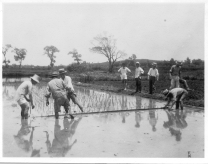COVER STORY
Cornell's global citizens roll up their sleeves and tackle real-world problems

Planting experimental plots of rice, Tai Ping Men Farm, Nanking, 1932. See larger image
Cornell also sponsors many on-campus programs dealing with the problems of the developing world. Prominent is the Mario Einaudi Center for International Studies, which provides a home to many international programs. Every year the center and associated programs bring dozens of former ambassadors, government leaders, scholars and other authorities to campus exploring the ethos of other continents and supporting courses on Islam, colonialism, political culture, democratization, economic development, corruption, ethnic relations, civil violence, war and foreign relations.
The Einaudi Center also annually funds more than 120 graduate students -- from anthropology and nutritional sciences to soil and crop sciences -- to conduct research in countries from Afghanistan to Zambia. Almost half of the grant recipients head to Asia, about one-quarter trek to sub-Saharan Africa and one-quarter to Latin America and Europe.
The developing world badly needs hardy and high-yielding crops that resist stress and pests, so Cornell rice breeder Susan McCouch and her students hand-pick desirable traits from wild rice and breed them into traditional cultivars, and then map these characteristics on the rice genome so breeders globally can adapt traditional varieties. Her students travel to Asia, Africa and Latin America to train plant breeders and other students.
"It's hard to grow rice in upstate New York," says Adam Famoso, a plant breeding and genetics doctoral student who works on aluminum tolerance in rice in McCouch's lab and has traveled to research stations in the Philippines and Colombia.
Ultimately, though, it is indigenous people who must benefit from Cornell's contributions, observes plant breeder McCouch. "We need to look beyond traditional mechanisms and networks to get this knowledge into the hands of those who need it for survival," she says.
"We learn so much by going and seeing the actual field conditions and learning from the producers who work in these conditions every day," says student Famoso. "The international focus is the whole reason I came to Cornell."
Additional reporting by Lauren Gold, Susan Kelley, Robert Emro, Sheri Hall, Mary Catt, Heike Michelsen, Stephanie Specchio, Susan Robertson, Linda McCandless and Ted Boscia.